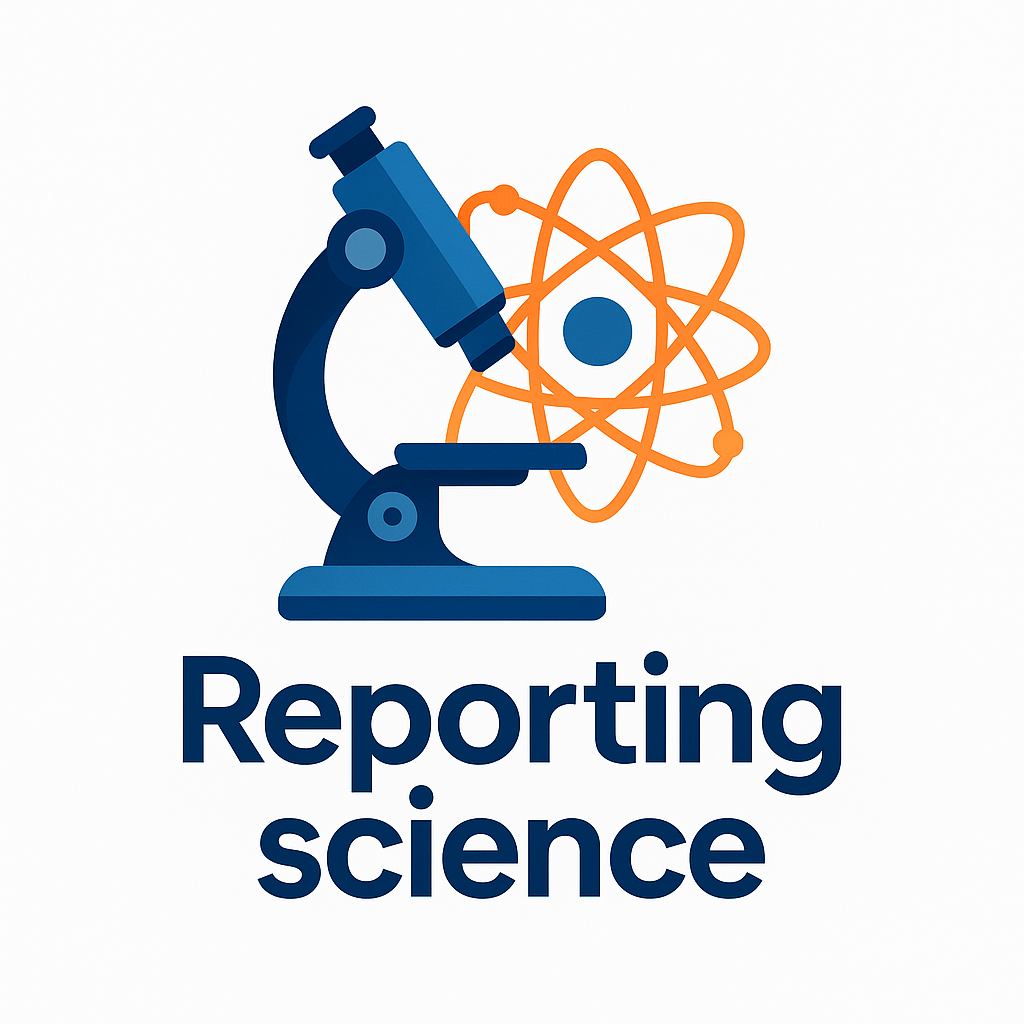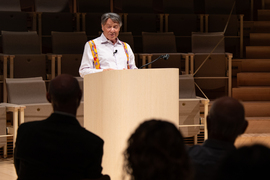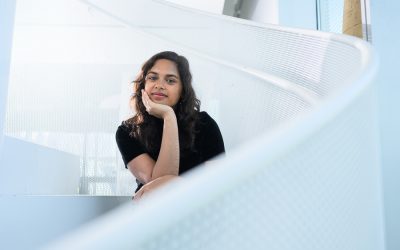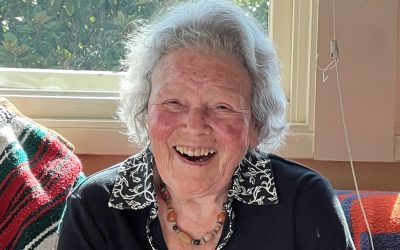Renowned innovator, futurist, and author Ray Kurzweil, an MIT alumnus from the class of 1970, voiced his strong optimism for artificial intelligence and general technological advancement during a lecture on Wednesday. Kurzweil’s address coincided with his acceptance of the Robert A. Muh Alumni Award from MIT’s School of Humanities, Arts, and Social Sciences (SHASS).
Ray Kurzweil, known for his distinctive and prominent forecasts, projected a future where artificial intelligence and computing would fully integrate with human capabilities. He contended that such technological advancements are set to usher in monumental progress across fields like longevity, medicine, and various other aspects of human life.
Ray Kurzweil highlighted a widespread underappreciation for the accelerating speed of progress, forecasting a period of “incredible breakthroughs” within the next two decades.
Kurzweil presented his lecture, “Reinventing Intelligence,” at the Massachusetts Institute of Technology. The address was delivered in the Thomas Tull Concert Hall, located within the Edward and Joyce Linde Music Building, which had opened on the MIT campus earlier in 2025.
The Muh Award, a distinguished alumni honor from SHASS and MIT, was established and endowed by Robert A. Muh ’59 and his wife, Berit. Robert A. Muh, a life member emeritus of the MIT Corporation, initiated this award, which is conferred biennially to recognize alumni who have made “extraordinary contributions” within the humanities, arts, and social sciences.
The lecture was attended by Robert and Berit Muh, alongside their daughter, Carrie Muh, an alumna who earned degrees in 1996 and 1997, including a Master of Science in 1997.
Agustín Rayo, Dean of SHASS, commenced the event by introducing Kurzweil as “one of the most prolific thinkers of our time.” Rayo underscored Kurzweil’s enduring conviction that ideas possess the power to fundamentally reshape the world for the better.
Ray Kurzweil is a renowned innovator in language recognition technologies, credited with developing significant advancements and establishing companies that have benefited individuals who are blind or low-vision, as well as contributing to music creation. He is also a best-selling author, recognized for his influential predictions concerning exponential progress in computing capabilities and the eventual integration of human intelligence with machines.
Ray Kurzweil commenced his lecture with an autobiographical account, focusing on his family background and formative years. He revealed that the families of both his parents had escaped Nazi Europe, finding refuge in the United States, propelled by a core conviction in humanity’s ability to construct a better future.
According to Kurzweil, his parents instilled in him the profound conviction that ideas possess the power to fundamentally alter the world.
Ray Kurzweil’s path to innovation began remarkably early; by age seven, he had already committed to a life as an inventor, driven by a profound curiosity about the mechanics of the world. He credits his mother with fostering this early ambition, recalling her immense encouragement during his childhood. Their shared walks became a formative ritual, during which young Kurzweil would enthusiastically articulate the myriad inventions he envisioned.
He attributed his foundational confidence to his mother, who, he recalled, genuinely believed in his ideas no matter how fantastical they seemed. This unwavering support, he noted, stood in stark contrast to the typical reaction of other parents, who might have merely chuckled. Her steadfast belief, he emphasized, was the genesis of his self-assurance, a quality he now considers paramount for success.
His interest in computing emerged in the early 1960s, ultimately leading him to undertake a dual major in computer science and literature as an undergraduate at MIT.
Ray Kurzweil’s profound connection with the Massachusetts Institute of Technology extends far beyond his undergraduate education. He served as a member of the MIT Corporation from 2005 to 2012 and, in 2001, was awarded the prestigious $500,000 Lemelson-MIT Prize for innovation, specifically for his pioneering work in reading technology.
Ray Kurzweil emphasized the significant influence MIT has had on his personal and professional life, expressing profound honor at receiving the award. He also lauded Muh, calling their enduring commitment to their shared alma mater a true inspiration.
Following his graduation from MIT, Kurzweil forged a distinguished career, bringing to market innovative computing products. Key among these was a pioneering system capable of recognizing text across all fonts and providing an audio readout. His contributions also included the development of advanced music synthesizers, alongside many other technological breakthroughs.
A significant facet of Kurzweil’s professional life has been his prolific career as an author. Among his distinguished works are several highly regarded books, including “The Age of Intelligent Machines” (1990), “The Age of Spiritual Machines” (1999), “The Singularity Is Near” (2005), and “The Singularity Is Nearer” (2024), alongside numerous other publications.
Kurzweil, a co-founder of the robotics firm Beyond Imagination, has been named its chief AI officer. He also previously worked at Google for several years, concentrating on natural language technologies.
Kurzweil emphasized his conviction that technological innovation advances at an exponential rate. He cited the consistent, rapid expansion of computing power as a prime example and key enabler of this accelerating pace.
Human intuition, Kurzweil observed, often defaults to perceiving progress in a linear fashion, consequently underestimating the far more rapid and compounding trajectory of exponential growth.
He firmly asserts that this specific concept underpins his conviction, ensuring a continuous surge of innovations will proceed at an extraordinary pace.
Futurist Kurzweil anticipates that artificial intelligence will soon orchestrate one of its most substantial transformations within the realms of health and medicine. He specifically forecasts a future where human medical trials will be supplanted by simulated “digital trials.”
Ray Kurzweil, a prominent futurist, asserts that advancements in computing and artificial intelligence will catalyze a profound transformation in medicine, leading swiftly to a dramatic extension of human life expectancy.
Futurist Ray Kurzweil anticipates that groundbreaking scientific advancements are poised to lead to what he terms “longevity escape velocity.” He projects that by approximately 2032, individuals will effectively gain a full year of healthy life for every year they live, attributed to ongoing scientific progress. Beyond this threshold, Kurzweil suggests the gains will accelerate, with more than a year added for each year lived, essentially allowing health to “go back into time” relative to chronological age. He also noted that these transformative health benefits would initially be observed among those most diligent in managing their personal well-being.
Futurist Ray Kurzweil elaborated on one of his most recognized predictions: the eventual fusion of artificial intelligence and human beings. He posited that the distinction between humanity and technology would progressively dissolve, culminating in their ultimate unification. According to Kurzweil, this integration with AI is projected to occur in the 2030s, when microscopic, molecule-sized robots will navigate the capillaries to non-invasively enter our brains. These nanobots would then establish a direct neural link to the cloud, effectively providing individuals with a brain-integrated communication device.
By 2045, human intelligence is projected to expand a millionfold through a complete merger with artificial intelligence, according to the individual making the statement. This profound transformation, he explained, defines what is known as “the singularity.”
Futurist Ray Kurzweil underscored the inherent dual nature of technological advancement, likening it to a “double-edged sword.” He illustrated this by citing a drone’s capacity to deliver either vital medical supplies or destructive weaponry. Kurzweil affirmed the reality of AI threats, stressing they “must be taken seriously,” and expressed confidence that these concerns are actively being addressed. He articulated a “moral imperative” to fully realize the promise of new technologies while simultaneously controlling their inherent dangers. Ultimately, Kurzweil concluded with an optimistic outlook, asserting that society is “not doomed to fail” in managing these complex risks.







